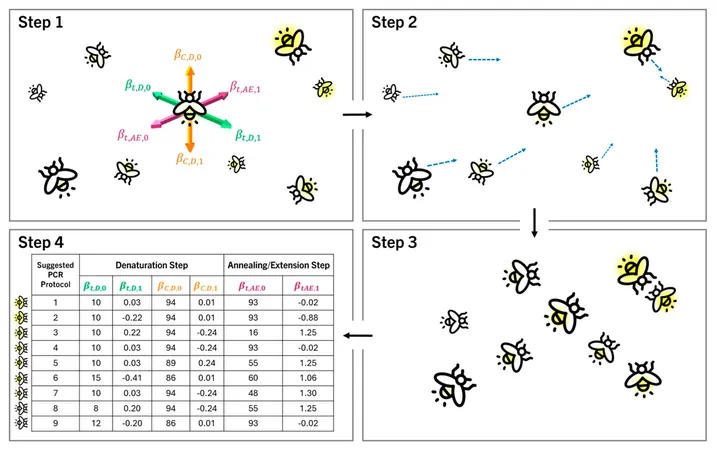
Revolutionary AI Innovations Set to Transform PCR Testing for DNA Diagnostics and Forensics
2024-09-30
Author: Mei
Introduction
Flinders University experts are heralding a new era in DNA diagnostics and forensics, thanks to groundbreaking developments in machine learning technology that's enhancing PCR (polymerase chain reaction) DNA profiling.
The Need for Improvement
While PCR has been a game changer since its inception in the 1980s, the methodologies behind it have remained largely unchanged, leading many in the field to seek innovative improvements. According to Dr. Duncan Taylor of Forensic Science SA, "Even a small enhancement in PCR could yield significant benefits for the hundreds of thousands of forensic and intelligence DNA samples processed annually, particularly those that are compromised or degraded."
Recent Research Breakthroughs
Recent research, published in the journal *Genes*, indicates substantial advancements in both the quality of DNA profiling and PCR cycling efficiency. Ph.D. candidate Caitlin McDonald, who spearheaded this study, expressed optimism about the findings. "Our approach has the potential to tackle long-standing challenges faced by forensic scientists, particularly with analyzing trace or degraded samples," McDonald noted during her presentation at the International Society of Forensic Genetics conference (ISFG 2024).
Introducing 'Smart PCR'
This "smart PCR" system represents a significant leap, as it intelligently optimizes amplification conditions tailored to various sample types, thus substantially improving the success rate of DNA amplification. This level of precision promises not only to enhance forensic investigations but also to elevate other critical domains, including clinical diagnostics and environmental monitoring, by allowing for efficient, high-throughput analysis while minimizing errors.
The Importance of PCR
PCR has established itself as a staple laboratory technique for numerous applications, from DNA fingerprinting to diagnosing genetic disorders and even detecting harmful pathogens like the COVID-19 virus.
University Support and Collaboration
Flinders University’s College of Science and Engineering has shown strong backing for this innovative research, with contributions from Professor Adrian Linacre and AI expert Associate Professor Russell Brinkworth. Their collaborative work introduces machine learning into the realm of PCR, creating adaptive systems that cater to the intricacies of sample types and cycling conditions for quicker, more precise outcomes.
Potential Implications
According to Professor Linacre, the implications of integrating AI with PCR could be vast. "With AI and machine learning, there lies tremendous potential to boost the sensitivity and accuracy of PCR tests," he stated, emphasizing the importance of non-coding DNA research in forensic applications since 1994.
Revolutionizing the Process
As Associate Professor Brinkworth elaborates, traditional PCR settings required uniform conditions, ignoring the varying characteristics of different samples. "By leveraging advances in machine learning and sensor technology, we've transformed PCR from a rigid procedure into a customized process that delivers higher quality and quantity of DNA in a fraction of the time," he explained.
Future Prospects
This innovative approach holds great promise for the future of forensic science and diagnostics, paving the way for faster resolutions in criminal investigations and enhancing the overall integrity of the criminal justice system. As technology continues to evolve, the integration of AI may unlock even greater advancements, potentially reshaping the landscape of DNA analysis as we know it.
Conclusion
Stay tuned, as this pioneering technology could revolutionize not just forensic science, but health diagnostics and environmental safety — the future of DNA testing is here!



 Brasil (PT)
Brasil (PT)
 Canada (EN)
Canada (EN)
 Chile (ES)
Chile (ES)
 Česko (CS)
Česko (CS)
 대한민국 (KO)
대한민국 (KO)
 España (ES)
España (ES)
 France (FR)
France (FR)
 Hong Kong (EN)
Hong Kong (EN)
 Italia (IT)
Italia (IT)
 日本 (JA)
日本 (JA)
 Magyarország (HU)
Magyarország (HU)
 Norge (NO)
Norge (NO)
 Polska (PL)
Polska (PL)
 Schweiz (DE)
Schweiz (DE)
 Singapore (EN)
Singapore (EN)
 Sverige (SV)
Sverige (SV)
 Suomi (FI)
Suomi (FI)
 Türkiye (TR)
Türkiye (TR)
 الإمارات العربية المتحدة (AR)
الإمارات العربية المتحدة (AR)